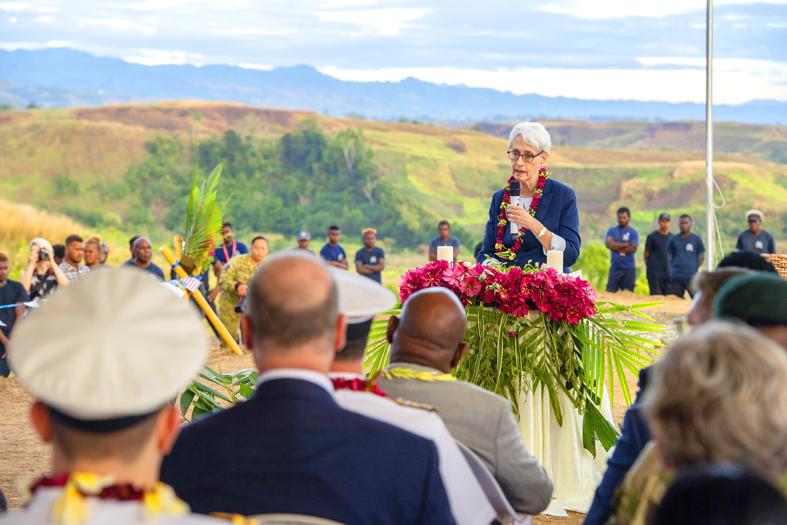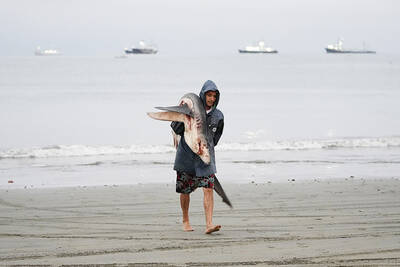Solomon Islands Prime Minister Manasseh Sogavare did not attend a weekend dawn service for a key World War II battle organized by the US, with local media reporting it as a “snub.”
The Solomon Star News said Sogavare was due to give a speech at a memorial service that was attended by US Deputy Secretary of State Wendy Sherman and ministers and officials from Australia, Japan and New Zealand on Sunday, but he did not appear.
Sherman later told a news conference she was sorry that the prime minister had missed a great opportunity to build a new partnership between the US and the Solomon Islands, the Solomon Star News reported yesterday.

Photo: AP
Sogavare’s office did not immediately respond to a request for comment.
Sherman met with Sogavare later on Sunday to discuss US aid programs, a statement from the prime minister’s office said yesterday.
At a ceremony yesterday, Sherman praised the role of Solomon Islanders in assisting the US in World War II.

Photo: AFP / Mannar Levo
A Japanese Navy sailor was stabbed during the service at Bloody Ridge, a spokesman at the Japanese embassy in the Solomon Islands said.
The motivation for the attack was unknown, the spokesman added.
Radio New Zealand spoke with medics who said the sailor would require stitches, but was doing well. Bloody Ridge community chief Wesley Ramo said the suspect was from a neighboring community, was under the influence and mentally unstable.
Also attending the ceremony were Japanese State Minister of Defense Makoto Oniki and New Zealand Minister of Defence Peeni Henare.
The suspect reportedly tackled the sailor to the ground during the attack before locals and US military personnel stepped in and detained him. Police then took him away and the ceremony resumed after a short break.
Additional reporting by AP

WAKE-UP CALL: Firms in the private sector were not taking basic precautions, despite the cyberthreats from China and Russia, a US cybersecurity official said A ninth US telecom firm has been confirmed to have been hacked as part of a sprawling Chinese espionage campaign that gave officials in Beijing access to private texts and telephone conversations of an unknown number of Americans, a top White House official said on Friday. Officials from the administration of US President Joe Biden this month said that at least eight telecommunications companies, as well as dozens of nations, had been affected by the Chinese hacking blitz known as Salt Typhoon. US Deputy National Security Adviser for Cyber and Emerging Technologies Anne Neuberger on Friday told reporters that a ninth victim

Russia and Ukraine have exchanged prisoners of war in the latest such swap that saw the release of hundreds of captives and was brokered with the help of the United Arab Emirates (UAE), officials said on Monday. Ukrainian President Volodymyr Zelenskiy said that 189 Ukrainian prisoners, including military personnel, border guards and national guards — along with two civilians — were freed. He thanked the UAE for helping negotiate the exchange. The Russian Ministry of Defense said that 150 Russian troops were freed from captivity as part of the exchange in which each side released 150 people. The reason for the discrepancy in numbers

A shark attack off Egypt’s Red Sea coast killed a tourist and injured another, authorities said on Sunday, with an Italian Ministry of Foreign Affairs source identifying both as Italian nationals. “Two foreigners were attacked by a shark in the northern Marsa Alam area, which led to the injury of one and the death of the other,” the Egyptian Ministry of Environment said in a statement. A source at the Italian foreign ministry said that the man killed was a 48-year-old resident of Rome. The injured man was 69 years old. They were both taken to hospital in Port Ghalib, about 50km north

MISSING: Prosecutors urged the company to move workers out of poor living conditions to hotels, but residents said many workers had already left the town Brazil has stopped issuing temporary work visas for BYD, the Brazilian Ministry of Foreign Affairs said on Friday, in the wake of accusations that some workers at a site owned by the Chinese electric vehicle producer had been victims of human trafficking. The announcement came days after labor authorities said they found 163 Chinese workers who had been brought to Brazil irregularly in “slavery-like” conditions at the BYD factory construction site in the northeastern state of Bahia. The workers were employed by contractor Jinjiang Group, which has denied any wrongdoing. Later, the authorities also said the workers were victims of human trafficking,